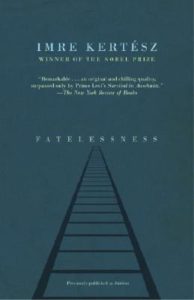 This is the autobiographical story of a holocaust survivor, Hungarian writer and Nobel Prize-winner, Imre Kertesz. To me, it is reminiscent of Primo Levi and even Victor Frankl.
This is the autobiographical story of a holocaust survivor, Hungarian writer and Nobel Prize-winner, Imre Kertesz. To me, it is reminiscent of Primo Levi and even Victor Frankl.
A boy of fourteen is snatched from Budapest by the Nazis and sent to Auschwitz, then Birkenau, and then on to other concentration camps. His descriptions of the places and of what happened, in calm, reasoned prose, are chilling.
Throughout, the boy maintains his steadfast insistence that the world must make sense. The idea of “fate” is inconceivable (thus the awkward title). That’s the main angle of the account. Nothing like this could happen just because you’re a Jew. That would be arbitrary. There had to be rational reasons for everything.
Throughout his long ordeal, he mentally explains everything away, with adverbs like “naturally,” and “of course.” The prisoners were starved to skeletons, several dying every day, but “naturally” you had to expect food shortages during a war.
The effect is like the example of a frog being boiled alive as the water temperature rises very slowly. The reader is lulled by the narrator’s calm explanations and yet alarmed by the awful suffering and by awareness the enormity of that historical moment.
When the boy is saved by the allies and returns home, nobody can understand his experience. But the reader can. And for his part, the boy cannot understand why they did nothing about the labor camps, to which they protest that he doesn’t realize that making a living was very tough during those years.
I was quickly drawn into the story by the author’s detailed description of life in Budapest among working-class Jews during the war, and the sense of the adults’ willful blindness to the Nazi extermination program, their insistence that it was merely “difficult times,” and the men would be back soon from the labor camps. I found it hard to believe that everyone could be so unaware of politics, international relations and history, but that’s how the situation is presented.
During the boy’s concentration camp ordeal, I became impatient with the repetitive scenes of horror. I am not a frog and not to diminish anyone’s suffering, but I thought the middle of the novel had pacing issues. I loved the ending, with the boy a stranger in his own land. Who has not felt that alienation when describing an extraordinary, life-changing experience to others who have never lifted their eyes from their quotidian worries.
The holocaust story needs to be retold often because it is a recurring tale of power, politics, and inhumanity. We can only hope that someday the lesson will be learned. This telling of the drama is artistically worthy of that formidable challenge.
Kertesz, Imre (1975/2004). Fatelessness (previously published as Fateless). (Tim Wilkinson, trans.). New York; Vintage, 262 pp.
